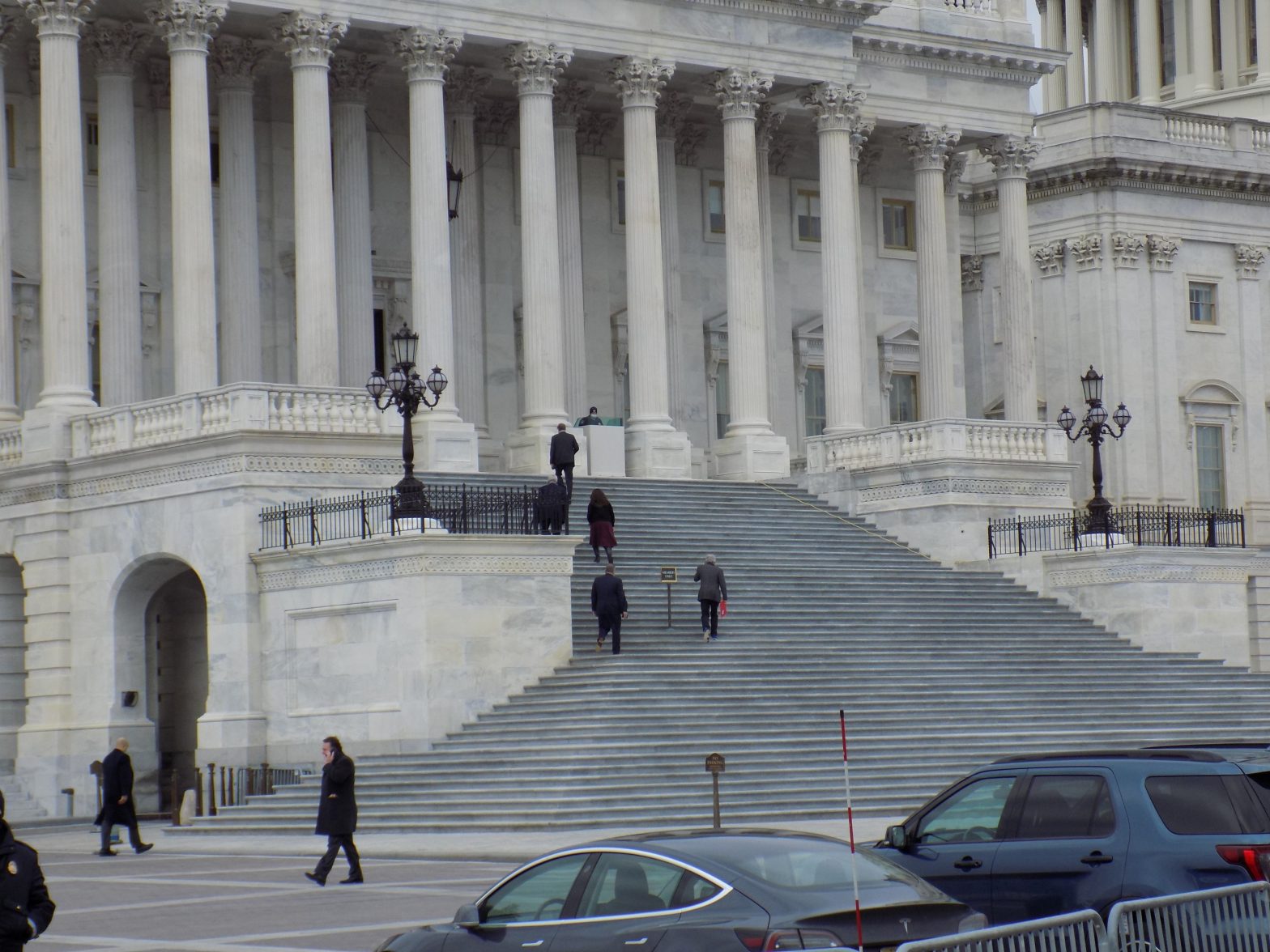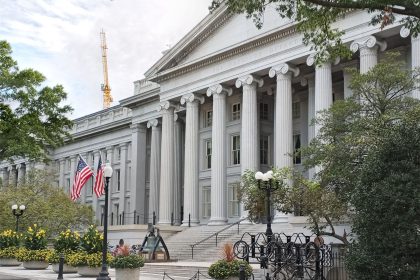Hoyer: PAYGO Exemptions to be Decided on Case by Case Basis

WASHINGTON – When the House on Monday adopted its rules package for the 117th Congress with a 217-206, party-line vote, Democratic House leaders knew there would be lingering controversies.
As they individually filed out of the Capitol, Republican members complained that changes imposed by the Democrats to the Motion to Recommit, had substantially weakened a procedural tool often employed by the minority in the chamber.
Meanwhile, some Democrats appeared divided over the implications of changes to the House PAYGO rule, which requires the cost of legislation to be offset by a corresponding spending cut.
“There were some controversial items, there always are,” said House Majority Leader Steny Hoyer during a pen and pad with reporters on Tuesday.
Every two years, as one Congress gives way to another, the majority party crafts a rules package to its advantage — yet another example of elections having consequences. Then its members and those in the minority party jab at each other over what ultimately gets included.
Motions to recommit, or MTR’s, historically afford the minority party the chance to offer changes to bills before the House.
The rules package adopted Monday, H. Res. 8, eliminates the minority’s ability to use MTR to alter bills on the floor — something it did eight times in the last Congress.
Under the change in the rules, the minority can only use the motion to recommit to send a bill back to committee.
“There are very few times I’ve ever been this embarrassed of this body — the hypocrisy of what I’m about to see, the hypocrisy of what you think you will defend,” House Minority Leader Kevin McCarthy, R-Calif., said on the House floor Monday.
According to McCarthy, the change will only make it easier to oppose Republican efforts to change or even kill bills.
“Everybody in this body knows it is wrong, but you feel you can grip power a little harder,” McCarthy said.
Rep. Tom Cole, R-Okla., the top Republican on the House Rules Committee, also attacked the change.
“This is a right that has been guaranteed to the minority for well over a century,” he fumed.
“Clearly, this proves that Democrats are afraid of Republican ideas, and they cannot effectively defend their own points of view,” he said in a written statement.
“However, it also confirms what we already knew. And that is the fact that Speaker Nancy Pelosi knows she is unable to rally and effectively lead her own slimmed down caucus. Rather than unify her own members, her solution is to punish and silence Republicans by overturning now-inconvenient precedents and traditions of the House,” he said.
On Wednesday, Hoyer was having none of it.
“The Republicans in my view, and Minority Leader McCarthy in particular, seized on a procedural motion” to score political points, he said.
“Some of you, perhaps, have heard my remarks [on the Floor] which were unusually long and extensive, chronicling what Republicans believed the MTR to be — a procedural delaying tactic, a gimmick, as it was called by former Majority Leader [Eric] Cantor, simply used to delay, obstruct and play political games,” he told the reporters on the conference call.
“The minority now claim, hypocritically, that [the MTR] was somehow an important right that was taken away from them,” Hoyer said.
“This is contradicted by all that they have said, and by the instructions they give to their members: ‘No matter what the MTR amendment may be, they should vote no.'”
“Procedurally, the rules package has adapted,” Hoyer said.
To reach consensus, the majority leader said, it was necessary for the rules package to “contain many compromises.”
“[But] we reached consensus within our own party,” he said.
“I remind the public that when they look at the partisan vote on the rules, the rules vote is almost always partisan, with the minority party voting against the rules proposed by the majority,” he added.
PAYGO Survives Attempts to Gut It
Despite efforts on the Floor to eliminate it, the Democratic majority overwhelmingly supported keeping the rule, though they did create two exemptions for legislation intended to address issues directly related COVID-19 or climate change.
While the rules package does not directly provide any PAYGO exemptions, it gives the Budget Committee chairperson authority to declare legislation providing economic and health responses to the pandemic, and measures designed to combat climate change, as having no cost.
Progressive Democrats immediately embraced the new exemptions, some going so far as to suggest they may open a path to reviving such policy proposals as Medicare-For-All and the Green New Deal.
But the fiscally conservative Blue Dog Coalition was already pushing back. In a letter to House Budget Committee Chairman John Yarmuth, Blue Dog Reps. Stephanie Murphy, of Florida, Tom O’Halleran, of Arizona, and Kurt Schrader, of Oregon, said while the exemptions invest more power in the chairman, “the ultimate authority on what should be exempted from PAYGO requirements remains with a majority of the House of Representatives.”
The House, they said, “must pass a rule for each bill considered under regular order.”
“This is a right that members of the Blue Dog Coalition will never surrender,” the Blue Dogs added.
“Every member of the Blue Dog Coalition recognizes that PAYGO (both the rule and statute) has an emergency exemption, which allows us to properly respond to national emergencies, such as the COVID-19 pandemic,” they said. “In fact, all of our members supported applying the emergency exemption to COVID-19 relief legislation to help meet the needs of this historic crisis.
“And although the question of exempting PAYGO for well-crafted legislation to confront the climate emergency has not faced us, our Coalition will not support attempts to misapply or misuse the COVID-19 and climate change exemptions.
“Therefore, we ask that you individually and collectively police and enforce the new exemptions now adopted in the limited scope as intended and expressed and only where a practical PAYGO option is not truly available.
“We sincerely hope that you will not allow their utilization to facilitate a misguided view that federal deficits and debt are inconsequential, nor to allow colleagues to avoid the difficult decisions that will be necessary to both meet critical needs and maintain fiscal responsibility,” they concluded.
On Wednesday, Hoyer said “the assertion the Green New Deal and Medicare-for-All would qualify under the extension, I think, is incorrect.
“The very special needs we have to address under COVID-19 are almost all outlined in the Heroes One and Heroes Two, in the Cares Act, or other pieces of legislation we have passed,” he said.
“With respect to climate, we expect that issues related to climate will be covered by this, as well as matters that may be related. And when I say related, I mean directly.
“We believe, frankly … and the Blue Dogs have already acknowledged … that these two issues are both existential threats to us and would undoubtedly be declared by the president to be emergencies and we have acted in that vein as well,” Hoyer said. “But we do not believe these exemptions will have any broader application and that PAYGO will still apply.”
Hoyer emphasized that moving forward, “We’ll have to make a decision, issue by issue as to whether it qualifies as an emergency and potentially for an exemption.
“It might be that there are emergencies that are unrelated to COVID-19 or climate change — i.e. a tornado that damages a city or a community,” he said. If a majority in the House decided the event didn’t warrant an exemption under PAYGO, “It would deal specifically with that particular action” Hoyer said.
“I don’t know if I’ve clarified that. But I think what the Blue Dogs said correctly is that they will make a determination on a case by case basis as to whether or not they believe the exemption applies and act accordingly. And we will work together,” he said.
Other Provisions
The new rules also establish an Office of Diversity and Inclusion to guide House offices on how to “recruit, hire, train, develop, advance, promote, and retain a diverse workforce.”
The package also attempts to honor all gender identities by changing pronouns and familial relationships to be gender-neutral.
Among specific changes, the new rules strike ‘‘himself or herself’’ and insert ‘‘themself,” and changes “chairman” to “chair.”
The rules also change familial terms to make them gender neutral, changing “uncle” and “aunt” to “parent’s sibling,” for example.
Democrats said the rules change was designed to reflect the increasingly diverse Congress. Republicans weren’t buying into it.
During an appearance on Fox News, Minority Leader McCarthy accused the Democrats of “trying to limit our First Amendment rights.”
“You no longer can say ‘father, mother, son, daughter,’” he claimed.
In truth, the change only affected the language in House rules but doesn’t apply to members’ own language or legislative proposals.
The new package strengthens congressional oversight, seeks to protect whistleblowers and specifically defines that any current and former White House employees can be subpoenaed.
It also renews proxy voting, which allows lawmakers to vote remotely during the pandemic by designating a lawmaker to vote on their behalf.
Over the weekend, Democrats dropped a provision barring members, officers and employees of the House from electronically “disseminating” — sharing on social media, distorted or manipulated images — videos or audio files through official accounts.
The rule also sought to make sharing of so-called “deepfakes” an ethics violation, but it drew concern from members about how it would be applied.
As an alternative, the package voted on Monday merely asks the House Ethics Committee to study the issue and report back by year’s end on what, if any, changes should be made to the code of conduct.























